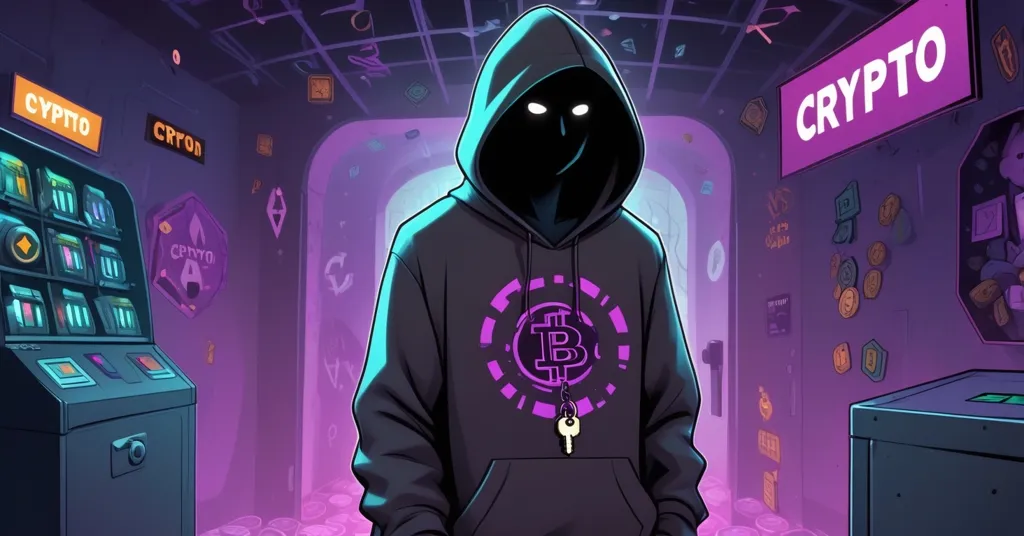Pump.fun Ex-Developer Jailed for $2M SOL Theft and Bail Breach in London

Pump.fun Ex-Developer Jailed for $2M SOL Theft and Bail Breach
Jarett Dunn, a former senior developer at Pump.fun, a Solana-based meme coin platform, is now locked up in London’s HMP Pentonville after a wild ride of crypto theft and legal blunders. Accused of stealing nearly $2 million in SOL tokens in May 2024, Dunn’s latest misstep—breaching bail conditions—has landed him behind bars as he awaits a pivotal hearing that could seal his fate for up to a decade.
- Theft Exposed: Dunn swiped $2 million in SOL from Pump.fun, admitting guilt but blaming a toxic workplace.
- Bail Violation: Unauthorized relocation and ankle monitor tampering in June 2025 led to his re-arrest.
- Platform Boom: Pump.fun hit a $6 billion valuation with a $600 million ICO, despite the scandal.
The Heist: How Dunn Pulled Off a $2 Million Crypto Theft
The saga kicked off in May 2024 when Dunn, exploiting his insider status at Pump.fun, accessed private keys—essentially secret codes that grant full control over a crypto wallet and its funds—and manipulated bonding curve contracts, which are mechanisms setting token prices based on supply and demand, often favoring early buyers. With this access, he siphoned off roughly $2 million in SOL tokens, the native cryptocurrency of the Solana blockchain. He wasn’t subtle about it either, diverting funds to multiple wallet addresses and even airdropping chunks to random holders of Solana meme coins and NFTs, almost like a twisted Robin Hood of the blockchain.
Shortly after, Dunn took to his X account, @STACCoverflow, to own up to the theft with a audacious edge. During a Twitter Spaces session, he reportedly declared:
Everybody be cool, this is a robbery.
But his reasoning was less cinematic. He pointed to a hostile work environment at Pump.fun, claiming it drove him to the edge. More damning, he accused the platform of operating as an unregistered securities exchange and a casino-like setup that “inadvertently hurt people.” These are serious allegations, tapping into ongoing debates about whether such platforms are innovative or just polished traps for naive investors, as discussed in broader community conversations around Dunn’s actions.
Pump.fun: Meme Coin Factory or Speculative Circus?
For those new to this corner of crypto, Pump.fun is a Solana-based platform often dubbed a “meme coin factory.” It allows anyone to create and trade speculative tokens, usually driven by internet humor or viral trends, with minimal barriers. Tokens like Moo Deng (MOODENG), Fart Coin (FARTCOIN), and Peanut The Squirrel (PNUT) have turned into cash cows, fueled by community hype rather than any fundamental value. This model has propelled Pump.fun to dizzying heights—lifetime revenue over $770 million, a recent $600 million Initial Coin Offering (ICO), and a valuation topping $6 billion, though not without significant controversy over its valuation and ICO practices. Internet memes turned into billions? Either we’re witnessing genius or a collective fever dream.
But there’s a flip side. Critics argue platforms like Pump.fun enable pump-and-dump schemes—scenarios where prices are artificially inflated by insiders or hype, only for early players to sell off, leaving latecomers with worthless tokens. Dunn’s accusations of unethical practices aren’t just personal gripes; they echo a broader skepticism about whether meme coin platforms are tools for democratized finance or just a glitzy casino where retail investors are the house’s guaranteed losers, a concern often raised in discussions on the risks of such platforms. Is Pump.fun a revolution or a roulette wheel? That’s the billion-dollar question.
Dunn’s Downfall: From Guilty Plea to Bail Breach
After the theft, Dunn was arrested and released on bail, initially pleading guilty to fraud by abuse of position in October 2024. Under UK law, this charge carries a maximum 10-year sentence for amounts exceeding £500,000 (about $640,000), and with $2 million at stake, he’s staring down a hefty penalty. But in a move that likely baffled his own defense, he tried to retract his plea, costing him his legal representation. Then, in June 2025, Dunn doubled down on poor decisions by relocating from London to Liverpool without permission and tampering with his ankle monitor—guess he thought Solana’s transaction speed applied to real life too. Unsurprisingly, authorities hauled him back in, and now he’s cooling his heels in a London prison, with the bail breach adding serious legal consequences.
Recent posts on his X account, managed by a friend named Mark Kelly, suggest Dunn might be resigned to his fate. Described as “remarkably cool and zenlike,” he’s hinted at accepting his guilty plea once more. Earlier rants had a different tone, with Dunn musing about wanting to “kill Pump.fun because it’s something to do” and claiming his actions would “change the course of history.” Delusional or not, it paints a picture of personal distress mixed with professional bitterness—a cocktail that doesn’t justify a $2 million heist but adds a human layer to this crypto crime story, as detailed in reports of the initial theft and subsequent jail time.
Industry Risks: Insider Threats in the Crypto Wild West
Dunn’s case isn’t a one-off. Insider threats are becoming a nasty stain on the crypto industry’s already patchy reputation. Just look at the Coinbase data breach in May 2025, where bribed staff leaked sensitive info, or the Pond.fun hack by a lead engineer in March 2025, costing users millions. These incidents scream a brutal truth: decentralized platforms, for all their rhetoric of freedom and transparency, can be painfully vulnerable to those with privileged access. Dunn, as a senior developer, had the digital keys to the kingdom, and no multi-signature wallets—systems requiring multiple approvals to access funds—or third-party audits stopped him. Without such safeguards, user funds are just sitting ducks for the next disgruntled coder with a grudge, a risk especially prevalent in Solana meme coin ecosystems.
Zooming out, this mess casts a shadow on Solana’s ecosystem, even if the blockchain’s core tech isn’t at fault. Repeated scandals tied to Solana-based platforms could spook investors or draw regulatory hawks closer. Meme coins, with their viral charm, are already a lightning rod for criticism—often seen as the Wild West within the Wild West of crypto. And with roughly 90% of Pump.fun tokens reportedly losing nearly all value within a month of launch, per industry analytics, the speculative circus often leaves retail investors holding the bag. Dunn’s theft is a glaring red flag for DeFi’s blind spots, begging for better security protocols and maybe a dose of accountability in a space that fetishizes freedom above all else.
Regulatory Heat: Could This Spark a Crackdown?
Dunn’s allegations and legal troubles also raise the specter of regulation. In the UK, where he’s being prosecuted, the Financial Conduct Authority (FCA) has already been eyeing crypto platforms with suspicion, often warning about the risks of unregistered entities. Globally, frameworks like the EU’s Markets in Crypto-Assets (MiCA) regulation, rolling out post-2024, aim to impose stricter rules on DeFi outfits. Could a high-profile case like this push authorities to clamp down harder on meme coin platforms and other speculative crypto ventures? It’s not a stretch, especially given the growing regulatory concerns around platforms like Pump.fun. Dunn’s claim that Pump.fun operates as an unregistered securities exchange might be self-serving, but it’s the kind of accusation that regulators love to latch onto when justifying new oversight.
From a Bitcoin maximalist lens, this chaos in Solana’s meme coin niche contrasts sharply with Bitcoin’s relative stability as a store of value. Bitcoin isn’t immune to scandals, but its focus on being a decentralized, censorship-resistant money stands apart from the speculative gambling dens of altcoin ecosystems. Still, let’s not dismiss Solana or platforms like Pump.fun outright—they fill a niche of experimentation and community-driven projects that Bitcoin, by design, doesn’t touch. The trick is balancing that innovation with guardrails to prevent disasters like Dunn’s theft. Decentralization shouldn’t mean a free-for-all for bad actors.
Key Questions Answered on the Pump.fun Scandal
- What drove Jarett Dunn to steal $2 million in SOL from Pump.fun?
Dunn blamed a toxic work environment and accused Pump.fun of unethical practices, including operating as an unregistered securities exchange and harming users through casino-like operations. - What legal consequences does Dunn face for his actions?
He’s looking at up to 10 years in prison for fraud by abuse of position under UK law, plus a potential additional 12 months for breaching bail conditions, or remand until his hearing. - How has Pump.fun thrived despite this insider theft scandal?
With a $600 million ICO and a $6 billion valuation, driven by meme coins like Moo Deng and Peanut The Squirrel, Pump.fun shows that investor hype often overshadows internal drama—at least for now. - What broader risks does this case reveal in the crypto industry?
It highlights insider threats, weak security protocols, and regulatory gaps, especially on speculative platforms like meme coin factories where user funds are perpetually at risk. - Could this impact Solana or the meme coin market long-term?
While Solana’s core functionality remains unaffected, recurring scandals on its network might erode investor trust or invite tighter regulation, potentially cooling the meme coin frenzy. - Are meme coin platforms like Pump.fun a scam waiting to happen?
Not inherently, as they democratize token creation and empower communities, but their speculative nature and lack of oversight often lead to pump-and-dump schemes, exploiting naive investors.
Pump.fun’s Paradox and the Path Forward
Peeling back the layers, Dunn’s story is a microcosm of crypto’s dual nature. On one side, Pump.fun embodies DeFi’s chaotic brilliance—turning internet jokes into billion-dollar valuations and giving power to grassroots creators. On the other, you’ve got a disgruntled insider like Dunn, whose actions and accusations remind us this space is still a minefield of ethical quicksand and security pitfalls. Sure, decentralization promises disruption and liberty, but at what cost when the gatekeepers can just walk off with the vault?
As we push for a decentralized future with Bitcoin leading the charge toward financial sovereignty, let’s not ignore the Jarett Dunns of the world. They’re not just rogue players; they’re symptoms of a system screaming for better guardrails. Whether it’s multi-signature wallets, third-party audits, or restricted access protocols, the crypto industry needs to evolve—or risk losing the trust of the very users it claims to empower. Dunn might be resigned to his cell, but the questions his case raises are far from locked away. They’re a call to action for a space that can’t afford to keep repeating the same costly mistakes.



